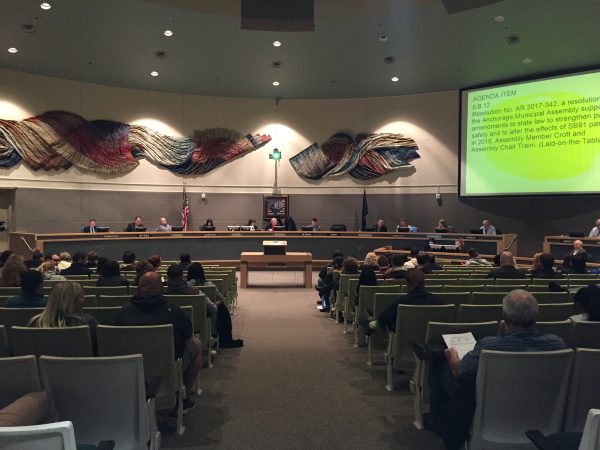
Anchorage drivers will see a slight bump at the pump early next year.
At its Tuesday night meeting, the Anchorage Assembly voted for a new excise tax on gasoline and diesel fuel. Motorists will pay an extra 10 cents per gallon starting in March of 2018.
The measure is expected to generate around $14 million dollars a year annually in revenue, but the move does not increase overall taxes for residents. In keeping with recommendations from the city’s Budget Advisory Council, the new charge falls under the municipality’s tax cap, and money collected will offset property taxes. According to the mayor’s administration, the average home-owner in Anchorage will see a drop in their property tax bill of $131. In a document submitted by the sponsors, they calculate that a driver putting 10,000 miles annually on a vehicle that gets 23 miles per gallon will pay $43 more in a year.
Assembly Chair Dick Traini, a major supporter of the measure, said the aim is shifting some of the tax-burden off property owners.
“Our chance tonight is to diversify the income stream coming into this town,” Traini said ahead of the vote.
The measure passed 10 to one, along with an amendment to adjust the tax for inflation. Eagle River Assembly member Amy Demboski was the lone vote against the ordinance.
The meeting also heard public testimony on the Administration’s 2018 budget, which the Assembly will vote on later this month. A large number of people asked the Assembly to consider approving more money for drug treatment. Supporters and staff from the Alaska AIDS Assistance Association testified on how extra municipal funds could expand the organization’s syringe exchange program, decreasing risk and public health costs among injection-drug users.
In two weeks, when the Assembly finalizes the city’s budget, they’ll also be taking testimony on a proposal to add a new 2 percent tax on alcohol to pay for substance abuse treatment. Though the state taxes alcohol, officials in Anchorage have long complained the revenues don’t adequately fund treatment. Fairbanks and Juneau both collect local taxes on alcohol sales, according to a memorandum submitted by Traini, who introduced the ordinance.
Zachariah Hughes reports on city & state politics, arts & culture, drugs, and military affairs in Anchorage and South Central Alaska.
@ZachHughesAK About Zachariah




